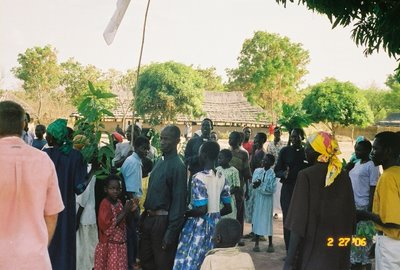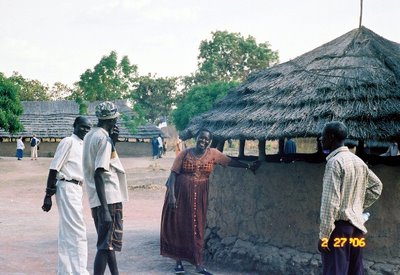 After the visits in Nideh & Mariba, we went on to Buigi. Like all the other villages, they welcomed us warmly with songs and drumming and a procession that was nearly overwhelming to me.
After the visits in Nideh & Mariba, we went on to Buigi. Like all the other villages, they welcomed us warmly with songs and drumming and a procession that was nearly overwhelming to me.While the clergy were vesting, the rest of us had time to chat. Here are Rebekah (center) and Simon (right).

I had an interesting exchange with Simon, the young man who had been our driver that day and who was coordinator of the Samaritan’s Purse. He was surprised that I was so old (50’ish) and had no husband. And no children. It seemed to me that this was (a) beyond his comprehension and (b) a failing of some sort. This was hard for my U.S. brain to take in. In the U.S., my situation is not so unusual. But talking with Simon in Lui, I gathered it was not merely unusual, but also scandalous.
Later, I told Deborah about this exchange. She and her husband married late, and they have no children. She told me of an exchange with one of the Lui folks, who – when learning of her situation – sadly remarked, “So your family is already dead.”
Wow! When I first heard that comment, I thought it was incredibly judgmental. But then, after living with the Moru, I got to understand it a bit more.
In Lui, if you do not have children/nieces/nephews/grandchildren, then that means you don’t have anyone to grind grain for you, make bread for you, and so on. I guess it means that you are consigned to a life of misery – if you are one of those who lives beyond the average Sudanese age (of mid-40s).




No comments:
Post a Comment